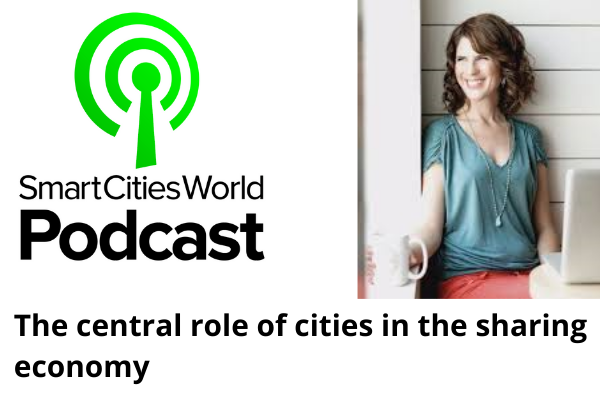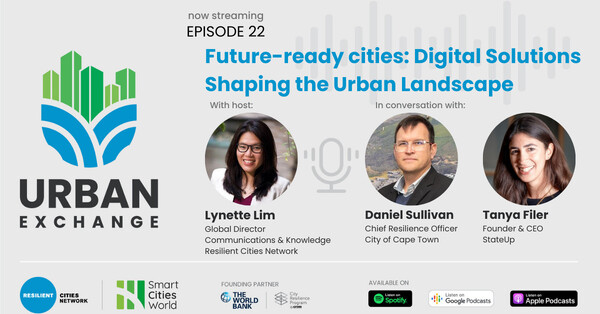Special Reports
SusHi Tech Tokyo 2024: experience ‘Tokyo 2050’ todaySponsored by The SusHi Tech Tokyo 2024 Showcase Program Executive Committee
Podcast: The central role of cities in the sharing economy, with Chelsea Rustrum
There’s a big opportunity for cities to better harness the sharing economy to achieve municipal goals and give power back to the people, Rustrum says.


In the latest SmartCitiesWorld podcast, we talk to sharing economy expert Chelsea Rustrum, co-founder of Instigation Protocol, founder of the Blockchain for Good community and the author of It’s a Shareable Life.
Rustrum’s book was published in 2014 when many people were barely waking up to the potential impact of the emerging sharing economy.
“What excited me so much was seeing a different way of interacting and connecting with other individuals," Rustrum said. "Through an item, a service, ride-sharing, sharing somebody’s home or even a shared office space, I found that it created a whole new environment and way of thinking about business and transaction.”
Circles, not lines
Rustrum grew up online. As a young entrepreneur who “accidentally started making money” via a couponing website she built in just 24 hours at the age of 14, she got involved in early co-working spaces and couch-surfed.
“What I learned was that whether you’re giving or receiving, everybody is receiving. If I stay in someone’s home and we make a meal together, they feel like they’re receiving too, even though they’re providing a roof over my head. I began to see exchange as a circle rather than a line and it helped me start to see that what we’re actually transacting is value.
“And maybe it’s not a transaction at all; it’s a way to have deeper relationships and trust with other individuals. I saw this was the beginning of a peer-to-peer revolution.”
Although the sharing economy continues to change shape and form, Rustrum believes the questions of what value is, how we transfer it and derive meaning from it remain central.
Cities: The ultimate platform for sharing
This sharing economy has already had huge implications for cities, in mobility, tourism, accommodation and more, but in many ways, leaders were unprepared for its impact. While most cities recognise the benefits and potential of increased sharing rather than owning to help meet their goals, there have also been clashes and legal challenges with sharing platforms relating to licencing, taxes, employment, safety and more.
Progress is being made towards better partnerships but a survey last year found that a third of US city leaders still describe their relationships with sharing economy companies as very poor.
Cities can – and should – play a much more active and central role in the sharing economy, according to Rustrum.
There’s no reason that these platforms need to have 40 per cent service margins.
“Cities are the ultimate platform for sharing,” she said. “Everything from ride-sharing to home-sharing has become a public policy issue. It’s the cities’ responsibility to think just like companies and have an ecosystem mindset, whereby they work with other cities to develop software and technologies that enable citizen participation.”
These applications could be related to anything from voting to creating open-source ride-sharing protocols or even a platform for home cleaning services.
“There’s no reason that these platforms need to have 40 per cent service margins when the people that are actually doing the work and providing their assets and resources are the ones that are providing the most value,” Rustrum said.
“It’s the cities’ responsibility, as these technologies build and grow, to either offer alternatives that are more competitive or to heavily regulate them” to avoid monopolies and to protect rights, she added.
Platform co-operatives
By taking the reins, cities could then begin to incentivise behaviour – for instance, through blockchain-enabled digital currencies – which could help nudge citizens to make choices that benefit public policy and the community.
Cities could also better engage with citizens about the definition of value and how it might be redistributed – for example, around childcare or elderly support which are typically uncompensated and unaccounted for in GDP.
"The future of the economy at large has to be shared value and ownership."
“Those are the meaningful conversations that we need to be having – even on a city level: what are the city’s values and in every decision, are we following our values? I really believe that the future of the economy at large has to be shared value and ownership.”
In the future, Rustrum thinks there will be a growth in ‘platform cooperatives’ – digital platforms that are collectively owned and governed by the people who depend on and participate in them.
“The sharing economy, blockchain, cities and platform cooperatives are going to have a convergence in the next three to five years, which is going to be really powerful,” Rustrum said.
"Cities have an even more vital role to play in the long run of the sharing economy than the platforms themselves.”
You might also like:

















